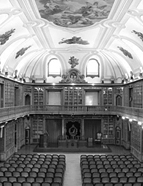

In the case of Mário Brandão, suffice, for example, to consider the way he transcribed documents and the detailed reasoning of the text, an attitude that was extensive to his contemporaries, to immediately judge his probity. But no researcher, as far as I can remember, went so far as to issue a certificate proving the accuracy of the transcribed documents, by appealing to the authority of the University Secretary, as António de Vasconcelos, a lecturer in Dogmatics at the time, did in 1897, with the publication of Francisco Suárez. After becoming director of the Archive, he expressed the same concern in documents he published in the University Yearbook 1900-1901 (p. 186). And in the biographical study of Brás Garcia Mascarenhas he began publishing in 1912, collected in a volume ten years later, he repeats: «It is all based on reliable and authentic sources, which we scrupulously quote, or copy into an appendix, so that any reader can easily verify the accuracy, and assess the legitimacy of our statements and conclusions» (p. 6). Salvador Dias Arnaut, who belonged to a third generation of historians, equally displays confidence in the detail, so as to allow for contrast. In A crise nacional dos fins do século XIV [National crisis in the late 14th century] (1960), this doctor requests the opinion of other coroners to describe the murder of Maria Teles in Coimbra by the son of Inês de Castro, John of Portugal, as he considered «the method of clinical history is analogous to that of History» (S. Dias Arnaut, «Oração ...[Prayer] », Biblos, 41, 1965, pp. 373-374).
It is worth noting that although the facts were "irremovable data", this was the starting point of history, which presupposed a theory, as recalled by Lucien Febvre (1878-1956) in 1947, fighting against a history that was not his own. This theoretical assumption was also accepted by traditional history when resorting to «ideas generales e hipótesis en la construcción histórica» (J. J. Carreras Ares, Razón de Historia, 2000, p. 148-149). Ideology was bound to be present, as is currently acknowledged in the historians of the regime, or in those who were able to synthesise, surpassing the researcher, to use terminology dating back to the time of António Sérgio's essays (1883-1969). Indeed, all historiography is ideological, which does not prevent its scientificity.
In the preface to G. Barros' (1833-1925) enriching editions of the initial volumes of the História da Administração Pública [History of Public Administration], T. Soares had already written that the author, besides the scientific method adopted and the «cold analysis of the facts and the serene and objective historical construction», always reveals «the guiding thread that directs and animates him, [which] reflects the 'person' who uses it to attain the so-desired synthesis» (volume I, 1945, p. XI).
